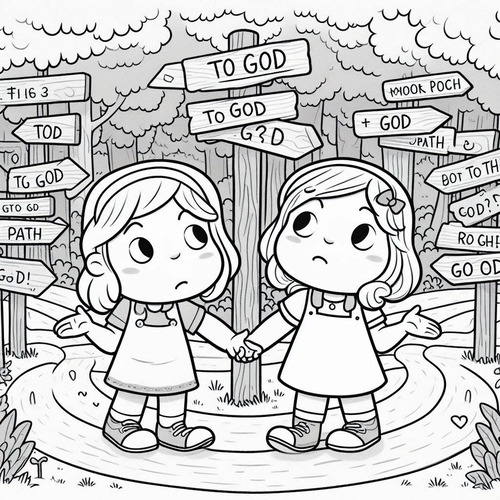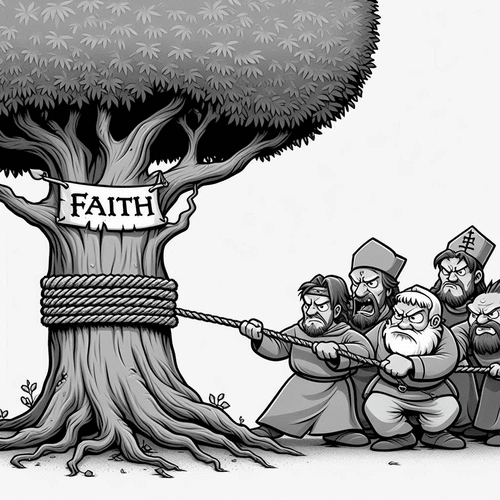Christian Answers to Islamic Challenges: Clarifying Monotheism
Clarifying Christianity’s Uncompromising Monotheism
Overview: At the core of Islam’s objection to Christianity lies the view that Christian doctrines such as the Trinity and the divinity of Jesus Christ represent a violation of pure monotheism. However, this perspective arises from a misunderstanding of these spiritual truths from a Christian framework. Christianity’s theology, when understood properly, emerges as fundamentally monotheistic while revealing profound mysteries about the very nature of the one true God. So, consider with us Christianity’s answers to Islamic challenges…
Christianity’s answers to Islamic challenges on The Triune Nature of God The doctrine of the Trinity is central to Christian theology, yet it in no way contradicts strict monotheism. The doctrine teaches us the one God eternally exists in three co-equal, co-eternal Persons—the Father, the Son (Jesus Christ), and the Holy Spirit. While distinct, these three Persons form an integrated unity, one Being, with a shared divine essence and glory. Far from polytheism, the Triune understanding reveals the richness of how our one God has chosen to manifest Himself. The church formulated the doctrine of the Trinity because it felt compelled, on the basis of its study of scripture, to affirm both that God is one and that there are three that are God. Scripture affirms not only the oneness of God, but also the divinity of the Father, the Son, and of the Holy Spirit, as also the three-in-oneness of God.
Accepting the Trinity tests our willingness to recognize that God’s wisdom surpasses our understanding. It challenges us to embrace divine truths even when they stretch our finite minds. Denying the Trinity often arises from a desire to simplify God or fit Him into human categories, rather than acknowledging His infinite complexity. The Trinity reminds us God transcends our comprehension, yet invites us into a relationship with Him.
Jesus Christ—Fully God, yet Fully Man Jesus’s identity as the Son of God has been particularly misconstrued. This title does not imply God evolved into multiple deities or had literal physical offspring, both of which Christianity rejects. Rather, it signifies Jesus is Himself God in the flesh—the second Person of the Triune Godhead who took on human form while remaining truly divine. His miracles, His sinlessness, His atoning death on the cross, and physical resurrection provide evidence that in Christ, God Himself entered into human history to redeem His people. Worshipping Jesus as Lord and Savior adheres to pure monotheism since He is one with the Father and Spirit. The Gospel accounts and letters repeatedly affirm Jesus’s divinity (John 1:1, Colossians 2:9).
The Resurrected Lord: Jesus’s bodily resurrection is the crux of the Christian faith, not a minor detail. For Christians, the reality that Jesus conquered death through His resurrection demonstrates His deity and the truthfulness of His claims. It fulfilled the prophecies of the Old Testament Scriptures which Christianity shares with Islam. While a profound mystery, the resurrection reveals Christ’s sacrifice as sufficient to atone for sins and offer new life. The New Testament provides eyewitness testimony to the resurrected Christ (1 Corinthians 15:3-8).
A Beautiful Paradox Ultimately, the doctrines of the Trinity, Christ’s deity, and resurrection are spiritual paradoxes—seemingly contradictory truths that fuse into a higher, beautiful synthesis incomprehensible to human logic alone. Christians approach these realities not through philosophical reasoning but by the gift of faith in God’s revealed truth found in the Bible. This faith emanates from the very monotheism found in the Old Testament that Christianity inherits, affirms, and fulfils.
Rebutting the “Corruption” Claim Some Muslims argue the Bible has been corrupted and cannot be relied upon regarding tenets such as the Trinity and divinity of Christ. However, Christians refute this assertion given the strong manuscript evidence validating the current biblical text. The Dead Sea Scrolls and thousands of other ancient texts demonstrate the Bible’s core doctrines were not invented later but can be traced to the earliest eras. While versions may differ slightly, there is remarkable consistency overall. The claim of substantive corruption contradicts the Bible’s persistent use by Christians globally for centuries.
Thus Christian answers to Islamic challenges on the Triune God, Jesus as Lord, and His resurrection emerge from a devout monotheistic worldview. Although complex, these beliefs do not undermine pure monotheism but provide a richer understanding of the one true God’s nature and relationship with humanity. Exploring these doctrines through the lens of Christian understanding can reveal immense profundity.
References: Grudem, W. (1994). Systematic Theology: An Introduction to Biblical Doctrine. Zondervan. : Stott, J. (2012). Basic Christianity. Eerdmans. : Lewis, C. S. (1952). Mere Christianity. HarperOne. : Packer, J. (1973). Knowing God. InterVarsity Press.
Related Reads
Editor's Pick

Why Do People Hate the Doctrine of Election?
…WHEN THEY REALLY SHOULDN’T Few Bible doctrines provoke stronger reactions than election. The idea that God chose some for salvation [...]

The Doctrine of Providence: Does God Really Govern All Things?
You’re sitting in the doctor’s office when the diagnosis lands like a thunderclap. Your mind races: Why this? Why now? [...]

No Decay, No Defeat: What It Means That Christ’s Body Saw No Corruption
On the Day of Pentecost, Peter stood before thousands and made a startling claim: David's body decayed in the tomb, [...]
SUPPORT US:
Feel the Holy Spirit's gentle nudge to partner with us?
Donate Online:
Account Name: TRUTHS TO DIE FOR FOUNDATION
Account Number: 10243565459
Bank IFSC: IDFB0043391
Bank Name: IDFC FIRST BANK






